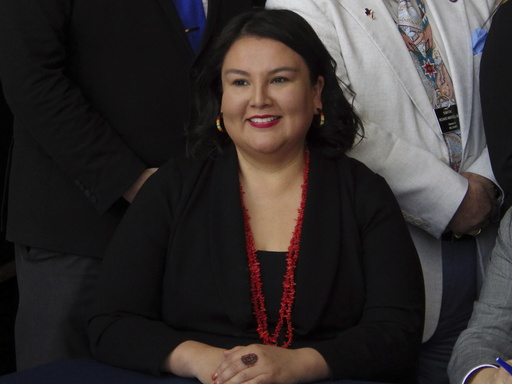In a significant legal development, a federal appeals court has intensified its stance on limiting lawsuits regarding racial discrimination in voting for seven Midwestern states. On Wednesday, the court further cemented its previous position that private individuals and groups cannot initiate these lawsuits under a crucial segment of the federal Voting Rights Act. This decision specifically undoes a prior legal win for two Native American tribes in North Dakota that contended against legislative redistricting, claiming it was unfair.
However, this may not be the final conclusion, as another appeals court has delivered a contrasting opinion on the matter, possibly leading to the U.S. Supreme Court stepping in to settle the dispute. This decision challenges an earlier accomplishment by the tribes who had effectively opposed North Dakota’s 2021 redistricting map on grounds that it diluted their voting capabilities.
The decision affects access to Section 2 of the Voting Rights Act by blocking the use of Section 1983, a federal civil rights law that typically allows individuals to sue state officials to protect constitutional rights. Jonathan Topaz of the ACLU Voting Rights Project explained that Section 1983 serves as a legal means for filing such lawsuits, but the Court’s ruling now restricts this for private entities in the seven states covered by the 8th Circuit Court of Appeals, including Arkansas, Iowa, Minnesota, Missouri, Nebraska, North Dakota, and South Dakota.
“These appellate rulings currently suggest that only the U.S. Attorney General can pursue Voting Rights Act claims in these states,” noted Mark Gaber, a legal expert and representative for the Spirit Lake Tribe and Turtle Mountain Band of Chippewa Indians involved in the case. The court’s majority opinion stated that for private lawsuits under Section 1983 regarding voting rights to proceed, the right to sue under Section 2 needs to be “unambiguously” established, which was not the case in this situation.
Judge Raymond Gruender, articulating the majority opinion, acknowledged that the tribes are relevant to the interest zone of the Voting Rights Act but stressed the lack of explicit individual rights being granted by the law. In contrast, Circuit Chief Judge Steven Colloton maintained in his dissent that Section 2 does grant litigation rights, supporting the tribes’ claims.
The court’s contentious decisions have sparked a division in legal interpretations, termed “circuit splits,” since the 8th Circuit’s unique stance conflicts with other judicial opinions on Sections 2 and 1983. The tribes are now contemplating their next legal steps following these reversals.
Previously, the tribes had secured a court mandate allowing them to elect officials in a unified legislative district, granting better representation for Native American candidates. The earlier map of 2021 had fragmented their community into separate districts, making it difficult for the Spirit Lake members to elect their choice of candidates, though Turtle Mountain members managed to maintain representation.
U.S. District Court Chief Judge Peter Welte had initially ordered a new district arrangement, deeming the legislature’s original boundaries inequitable under the Voting Rights Act. Later elections within this newly drawn map saw three Native American Democrats assume office.
Despite this new ruling, Republican Senate Majority Leader David Hogue affirmed that the 2021 legislative lines will be restored as definitive boundaries, potentially requiring special elections to address incumbent positions affected by the adjustments. Meanwhile, State Secretary Michael Howe’s office confirmed its intentions to operate with the 2021 map for the upcoming 2026 elections unless further legal actions are taken.
Republicans currently hold a robust majority within North Dakota’s Legislature, leaving the state’s political landscape largely unchanged following the conclusion of its biennial legislative session.


